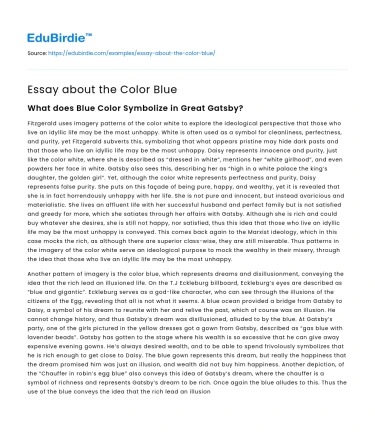What does Blue Color Symbolize in Great Gatsby?
Fitzgerald uses imagery patterns of the color white to explore the ideological perspective that those who live an idyllic life may be the most unhappy. White is often used as a symbol for cleanliness, perfectness, and purity, yet Fitzgerald subverts this, symbolizing that what appears pristine may hide dark pasts and that those who live an idyllic life may be the most unhappy. Daisy represents innocence and purity, just like the color white, where she is described as “dressed in white”, mentions her “white girlhood”, and even powders her face in white. Gatsby also sees this, describing her as “high in a white palace the king’s daughter, the golden girl”. Yet, although the color white represents perfectness and purity, Daisy represents false purity. She puts on this façade of being pure, happy, and wealthy, yet it is revealed that she is in fact horrendously unhappy with her life. She is not pure and innocent, but instead avaricious and materialistic. She lives an affluent life with her successful husband and perfect family but is not satisfied and greedy for more, which she satiates through her affairs with Gatsby. Although she is rich and could buy whatever she desires, she is still not happy, nor satisfied, thus this idea that those who live an idyllic life may be the most unhappy is conveyed. This comes back again to the Marxist ideology, which in this case mocks the rich, as although there are superior class-wise, they are still miserable. Thus patterns in the imagery of the color white serve an ideological purpose to mock the wealthy in their misery, through the idea that those who live an idyllic life may be the most unhappy.
Another pattern of imagery is the color blue, which represents dreams and disillusionment, conveying the idea that the rich lead an illusioned life. On the T.J Eckleburg billboard, Eckleburg’s eyes are described as “blue and gigantic”. Eckleburg serves as a god-like character, who can see through the illusions of the citizens of the Egg, revealing that all is not what it seems. A blue ocean provided a bridge from Gatsby to Daisy, a symbol of his dream to reunite with her and relive the past, which of course was an illusion. He cannot change history, and thus Gatsby’s dream was disillusioned, alluded to by the blue. At Gatsby’s party, one of the girls pictured in the yellow dresses got a gown from Gatsby, described as “gas blue with lavender beads”. Gatsby has gotten to the stage where his wealth is so excessive that he can give away expensive evening gowns. He’s always desired wealth, and to be able to spend frivolously symbolizes that he is rich enough to get close to Daisy. The blue gown represents this dream, but really the happiness that the dream promised him was just an illusion, and wealth did not buy him happiness. Another depiction, of the “Chauffer in robin’s egg blue” also conveys this idea of Gatsby’s dream, where the chauffer is a symbol of richness and represents Gatsby’s dream to be rich. Once again the blue alludes to this. Thus the use of the blue conveys the idea that the rich lead an illusioned life, allowing the Marxist ideology to mock them for thinking they have it all.
Save your time!
We can take care of your essay
- Proper editing and formatting
- Free revision, title page, and bibliography
- Flexible prices and money-back guarantee
In the Great Gatsby, patterns of imagery have an aesthetic and ideological purpose through their capacity to create a visual representation that evokes an emotional and critical response in the audience. The colors yellow and gold are used to convey the idea that greediness for wealth leads to corruption and moral decay, white represents the idea that those who live an idyllic life are the most unhappy, and blue reveals the idea that the rich lead an illusioned life. This repeated use of visual imagery in the depiction of color allows for the perception of a satirical representation of the Marxist ideology, which mocks the superstructure, or the bourgeoisie, for leading an illusioned life. Thus, the Great Gatsby uses color to establish a pattern of visual imagery, which evokes an emotional and critical response that serves an aesthetic and ideological purpose.






 Stuck on your essay?
Stuck on your essay?

